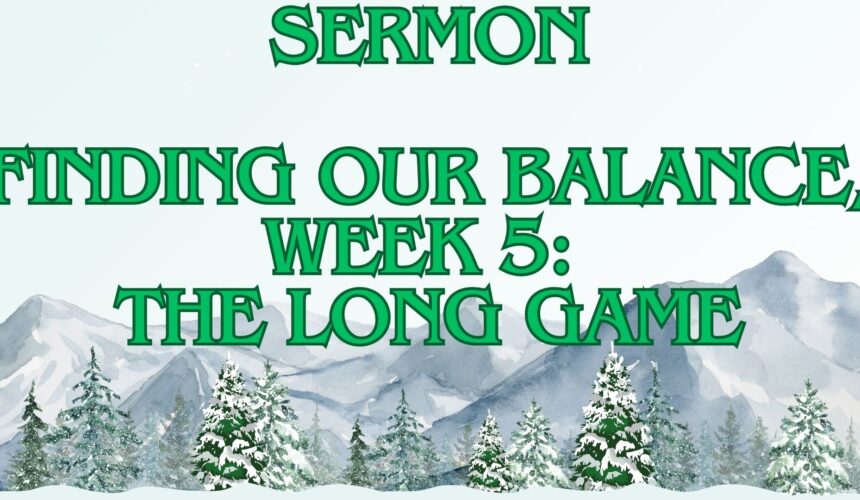March 2, 2025
Luke 9:28 – 36
When I was in high school, I never did any babysitting. I had friends who did. Some of them even turned it into an almost full time job, especially during the summer. They had families they worked for regularly, took the safety classes, first aid certification, all that. I never did that. I had other jobs; I was a janitor in a shopping mall and I did other kinds of labor. But taking care of other people’s children always seemed like a way bigger responsibility than I wanted.
Eventually, though, after I graduated from college and returned home to Alaska, I found myself looking for work. You would not say that I was setting the world on fire with my C-Suite Potential. I was pretty nearly broke and didn’t have many prospects. And then one day, I got a call from a woman in my home church. She said that she and her husband were going on a trip out of town, and they offered to pay me if I would stay at their home while they were gone and look after their children, who were like 11 and 9 at the time. I was still scared of the responsibility of taking care of other people’s children, but I was 22 years old by then. I figured I could probably handle it.
Even though this family was part of my home church, I’d been away in college for a few years and I didn’t know them that well. I didn’t know their kids at all. And in my first couple of days with them, I realized that even though we were in a small town in Alaska, these children just didn’t spend much time outdoors. This seemed strange to me, since a lot of my childhood was spent running around in the woods with my friends. We had a state forest across the street from my house that went for miles, and I loved being out there. So I thought, hey, why not introduce these kids to places I loved? I could take them down to the river, up into the mountains; we could walk some trails at the head of the valley where we lived. Alaska is kind of like Colorado: it’s a giant playground, and these kids hadn’t gotten to enjoy it much. So I figured it was about time.
Looking back, I realize that this may not have been the best decision. It turned out that because of their lack of experience in the outdoors, these kids didn’t know basic things that I had picked up along the way and kind of took for granted.
So by the time my 10 day stint as a nanny was over, I’m pretty sure the kids were secretly weeping with relief in their bedrooms, and the parents probably regretted ever knowing me. In those 10 days, the little boy got charged by a moose out in the woods. Apparently he didn’t realize it was a bad idea to pick up a stick and run, yelling, at a bull moose. Luckily, the moose didn’t trample him or anything. I grabbed him and ran for it and the moose decided we weren’t worth chasing.) On one of our hikes, the boy completely ignored my instructions for navigating around a couloir, and tried to walk right across the top of it on nearly glare ice. I barely caught him before he slid 200 feet down a mountainside into a bunch of big rocks at the bottom. I took the kids sledding on one of my favorite hills. He fell off the sled and broke his collarbone. The girl got a pretty good knot on her head from a fall and at one point nearly went hypothermic when she slipped into a frigid stream. So this gives you some idea of what that week was like.
Now I should say the kids recovered just fine. They even plucked up their courage to and talked to me at church now and again. And today, Gayla and I have four adult children, all of whom made it through childhood healthy and happy, and our grandkids are doing well. So maybe I learned something that week, I don’t know.
But even in all that craziness, there were moments of beauty. One morning, the two children and I were walking up a trail on a mountainside. We were climbing up through a fine mist and we suddenly emerged into bright sunshine. We stopped and turned around. For a few seconds we just stood there silent. Looking out over the landscape there were a few clouds hanging in the air, the last patches of spring snow on the mountain sparkling in the sun, blue sky above us. The little girl said, “It’s like down there we were in the bad world. But up here, we’re in the good world. I just want to stay here.”
At least in that moment, I felt like I made the right choice getting these kids outside and showing them some of my favorite places. And I knew what the little girl meant. Sometimes the clouds part and the sun shines and everything just feels right.
For the past few weeks, I’ve been reflecting on the ways that our Christian faith tradition can help ground us and balance us in chaotic times like the ones we’re living now. I talked about Nicodemus the Pharisee, who shows us that even when we’re outnumbered and overwhelmed, we can still stand up for the best in our tradition. We can still treat people fairly, with decency and compassion, and advocate for those things when no one seems to be paying them any attention.
The second Sunday of the series, we looked at Jesus’ choice to keep silent even when he was being unjustly accused of crimes that would eventually get him killed. I think there’s a lesson there for us: there are times when we can choose silence. We don’t have to rise to every bait. We can know the power of the path we’re on, just as Jesus did, and stay on that path even when we’re tempted to righteous rage and reactive outbursts. We can choose how and when to respond, mindfully and faithfully.
The Book of Ruth shows us the power of relationship and commitment to each other, especially to those who come from different cultures and backgrounds than we do. In times when it sometimes feels like leaders and political issues are working overtime to drive us apart, to leave us isolated and angry and unforgiving, we can refuse that isolation and alienation. We can choose instead to be in genuine relationship with those around us.
Last week, I talked about the scene in the book of Acts, when a man who can’t walk asks Peter for money. Peter says, “I have no silver or gold, but what I have I give you. In the name of Jesus, Christ of Nazareth, stand up and walk.” Not only are the man’s legs healed, but Peter brings him into the worshiping community, gives him a sense of worth and value, includes him in the people of God. When we decide to follow Peter’s example and offer what we have, God can do amazing things with what we offer.
So today is transfiguration Sunday. In the Christian calendar it’s the final Sunday before the beginning of Lent. Traditionally, the story we heard a few minutes ago is read in worship to mark the day.
In Luke’s version of the story we heard, Peter, John, James, and Jesus all go up a mountain together to pray. Luke doesn’t tell us what mountain it is or where, which I kind of think is a way of saying that this could be anywhere. And while they’re on the mountaintop, Jesus’ face and clothes begin to shine with a dazzling light. Moses and Elijah, these ancient Biblical heroes from Jewish legend, appear, talking to Jesus. A cloud descends on them, and they hear a voice saying, “this is my son. Listen to him!”
Now even though this episode appears in three out of the four Christian Gospels, it is hard to imagine a more Jewish story. It’s full of references to Jewish scripture. When Moses is leading the Israelites out of slavery in the Old Testament Book of Exodus, he meets God face to face by going up a mountain. When he comes back down, his face is glowing with a dazzling light, just like Jesus in this story. Luke tells us Jesus is talking to Moses and Elijah – the bringer of the ancient Hebrew law and Israel’s greatest prophet.
In the Book of Exodus, when Moses does climb the mountain to speak with God, he’s hidden in a cloud. The people watching can’t see God, but they hear God, much like Peter and John and James in the Gospel story. English translations of Luke often say Jesus is talking with Moses and Elijah about the “departure” he will accomplish – but in Greek, the original language of the Gospels, the word Luke uses is not “departure” but literally “Exodus.” Jesus is talking about the “Exodos” he is to accomplish, leading his followers to freedom.
Even Peter, when he talks about building dwellings for Moses and Elijah and Jesus, is referring to a ritual from what’s called the “feast of Booths,” a Jewish holiday that commemorates the 40 years of desert wandering of the Israelite people. So like I said, it’s hard to imagine a story more immersed in Jewish scripture than this one. I think Luke is trying to tell us that Jesus is the new Moses, the new Elijah, bringing the word of God to the people and leading us to freedom and a new way of life.
The whole story has a kind of dreamlike quality. The disciples see and hear and know things that they wouldn’t be able to in the normal, waking world. I think it’s told that way on purpose to raise an important question, not just for the three disciples on the mountain in the first century, but for all of us who are trying to be disciples here. The question is: what’s real? Is Jesus what he normally looks like, a Galilean Jewish peasant from a little town in the middle of nowhere? Is that real? Or is what they see on the mountain real? Are Peter and John and James seeing Jesus as he truly is and the world as it truly is: immersed in God, shimmering with God’s light and glory, God’s voice speaking to their ears and their hearts?
We all know the world is a pretty unstable place right now. We don’t know what’s coming next in our country or others. International alliances are shifting. Our domestic politics are chaotic. Our economy is changing. Religious engagement across the board is declining. You might think those are good things or bad things; opinions vary depending on who you ask. But they are at the very least quickly changing things. The ground is moving under our feet. But like I’ve said over the past four weeks, I think we can draw on lessons from our faith to give us the balance and the stability we need.
As turbulent as times are, we can still speak up for the best in our tradition. We can still choose mindful, faithful response rather than outrage and reactivity. We can fight isolation and division by committing to others and finding joy in the relationships we create. We can give what we have and know that God will use it. And we can remember what’s real: that we are in the presence of God no matter how things may look.
40 years ago, I was not the greatest babysitter, that’s for sure. But if I were having that conversation with the little girl on the mountainside today, I think I would try to tell her that sometimes we feel like the world is bad, and sometimes we feel like the world is good. But it’s all the same world. It’s all God’s world. God’s glory is all around us. God will outlast every nation, every political party, every possible social or political stance. The world does not belong to any nation or ideology or political party. Those things are human creations that come and go. And all the forces of chaos and outrage and blame and unforgiveness will never be enough to prevail against the gentle power of the crucified and resurrected Christ, or the humble and compassionate people who insist on living the life he taught.


